UNHCR issues latest Iraq advisory
This is a summary of what was said by UNHCR spokesperson Jennifer Pagonis – to whom quoted text may be attributed – at today's press briefing at the Palais des Nations in Geneva.
You have seen yesterday's press release on UNHCR's $60 million appeal for the Iraq situation in 2007, focusing on hundreds of thousands of the most vulnerable Iraqis displaced both internally and externally. While the appeal covers Iraq itself and five other countries in the region (Syrian Arab Republic, Jordan, Lebanon, Egypt, Turkey) that have received the largest number of Iraqis, some are also fleeing beyond the region - including to Europe. Of some 40 nationalities seeking asylum in European countries in the first half of 2006, for example, Iraqis ranked first with more than 8,100 applications. And statistics received from 36 industrialised countries for the first half showed a 50 percent increase in Iraqi asylum claims over the same period a year earlier.
In this type of displacement situation, UNHCR periodically issues advisories to governments on our position regarding the return of specific populations. We recently issued one such advisory on the protection needs of Iraqis outside Iraq and we've had a few calls about it from media around Europe.
We noted in the latest advisory that since the previous one in September 2005, the security situation in Iraq has deteriorated. Today's overall security situation is marked by extreme violence in Central Iraq and significant instability in the south of the country. Sectarian tensions sharply increased after the Samarra bombing last February, leading to targeted killings of thousands of Iraqis and ongoing massive displacement. The advisory notes that the overall situation can be characterised as one of generalised violence and one in which massive, targeted violations of human rights are prevalent.
In light of this dire security situation, the UNHCR advisory to governments recommends that Iraqi asylum seekers from Southern and Central Iraq should be favourably considered as refugees under the 1951 Refugee Convention given the high prevalence of serious human rights violations. And it notes that if an Iraqi from Southern or Central Iraq is not recognised under Convention grounds, a complementary form of protection be granted. It says no Iraqi from Southern or Central Iraq should be forcibly returned to Iraq until such time as there is substantial improvement in the security and human rights situation in the country.
UNHCR also advises against returns to the three Northern Governorates of persons not originating from there and recommends that asylum claims of Iraqis originating from the north be assessed based on 1951 refugee Convention criteria, taking into account the individual merits of the claim.
Related news and stories
Twelve years on, Syrian refugees face deepening debt and hunger
UN Refugee Agency warns of extreme hardship for forcibly displaced families this winter
Iraqi doctor provides care and comfort to Yazidi survivors
Iraqi doctor provides care and comfort to Yazidi survivors
Yazidi women box their way to recovery
The 'Boxing Sisters' of Rwanga IDP Camp in Duhok, Iraq
-
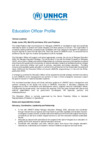
Education Officer
6 Oct 2026 -
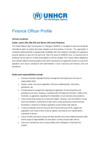
Finance Officer Profile
23 Jul 2026 -
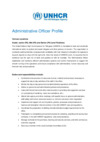
Administrative Officer Profile
23 Jul 2026 -
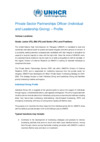
Private Sector Partnerships Officer (Individual and Leadership Giving)
28 Apr 2025 -
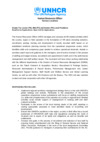
Human Resources Officer - Talent Pool Profile
12 Apr 2025 -
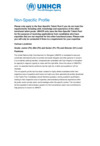
Non-Specific Profile
12 Apr 2025 -
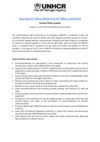
ICT Officer (Infra) Profile
Mar 2025 -
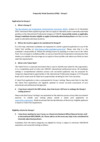
Group 2 Frequently Asked Questions (FAQ)
22 Jan 2025 The Recruitment and Assignments Administrative Instruction (RAAI), revised on 25 November 2019, introduced three applicant groups that can apply to internally and/or externally advertised positions in the International Professional category of UNHCR. -
Denmark
